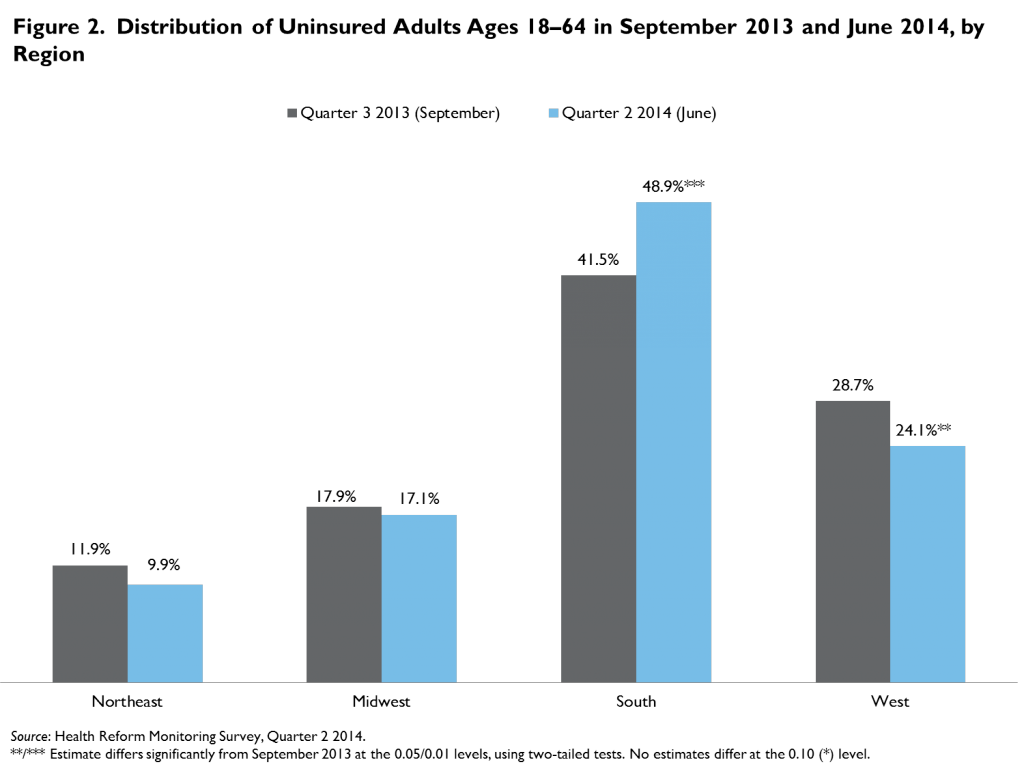INSTITUTE INDEX: How the GOP's Medicaid politics are hurting rural Southerners

Date on which Adam O'Neal, the Republican mayor of Belhaven, North Carolina, arrived in Washington, DC after walking 273 miles from his hometown to draw attention to the recent closure of his community's only hospital and to call for Medicaid expansion under the Affordable Care Act to prevent more such closures: 7/28/2014
Date on which Belhaven's hospital, Vidant Pungo, closed after a failed effort by the town to take it over: 7/1/2014
Number of days after the closure that a local resident died when she suffered a heart attack and had to wait an hour for a helicopter to take her to the nearest hospital: 4
Amount in unpaid care Vidant Pungo had provided since 2011 to patients lacking health insurance: more than $2 million
Number of rural U.S. hospitals that have closed since last year alone: 22
Number of those closures that were in states which blocked Medicaid expansion because of opposition from Republican governors and/or Republican-controlled legislatures: 20
Number of rural hospitals that have closed in Alabama in the past three years: 10
Number of rural hospitals that have closed in Georgia since 2000: 9
Of the 13 states in the South, number that have refused to expand Medicaid to date: 10*
Percent of rural hospital revenues that come from the government-financed Medicaid and Medicare programs for low-income and elderly patients: 60 to 80
Average percent loss that rural hospitals operate at because they treat higher rates of poor, uninsured and under-insured patients: 8.3
Percentage points higher that a University of North Carolina study found a community's unemployment rate was a few years after a rural hospital's closing, with one factor being industrial employers' reluctance to locate to an area without a hospital to treat workplace injuries: 1.6
Amount by which the UNC study found per capita income fell, in current dollars, following a rural hospital's closure: $1,000

Percentage points by which the portion of uninsured Southerners increased from September 2013 to June 2014 -- a time when other states were implementing or getting ready to implement Medicaid expansion: 8.4
Number of other U.S. regions where the portion of uninsured residents increased over that same period: 0
Rank of the South among U.S. regions with the highest rate of uninsured residents: 1
Percent of Southerners who remained uninsured as of June 2014: 48.9
Factor by which that exceeds the average percent of people lacking insurance in the other three U.S. regions: almost 3
Month in which the Florida Medical Association, a politically conservative trade association for the state's doctors, passed a resolution endorsing Medicaid expansion: 7/2014
Number of Florida residents who would benefit from Medicaid expansion: 1 million
Amount the refusal to expand Medicaid will cost in penalties to Florida employers because their lower income employees will be unable to get coverage: $145.7 million to $218.6 million
Figure spending by the National Federal of Independent Business (NFIB) for a recent ad campaign urging the Florida legislature to reject Medicaid expansion: 6
Amount the NFIB, which gets funding from conservative groups affiliated with the billionaire Koch brothers and Republican strategist Karl Rove, spent in 2010 as the chief litigant in a lawsuit that unsuccessfully sought to challenge the Affordable Care Act: $2.9 million
Estimated number of Americans who will die every year as a result as a result of states' decision to reject Medicaid expansion: between 7,115 and 17,104
* Alabama, Florida, Georgia, Louisiana, Mississippi, North Carolina, South Carolina, Tennessee, Texas and Virginia have refused Medicaid expansion. The only Southern states that have approved expansion are Arkansas, Kentucky and West Virginia.
(Click on figure to go to source. Chart from "Who Are the Remaining Uninsured as of June 2014?" by The Urban Institute; for a larger version, click here.)
Tags
Sue Sturgis
Sue is the former editorial director of Facing South and the Institute for Southern Studies.
